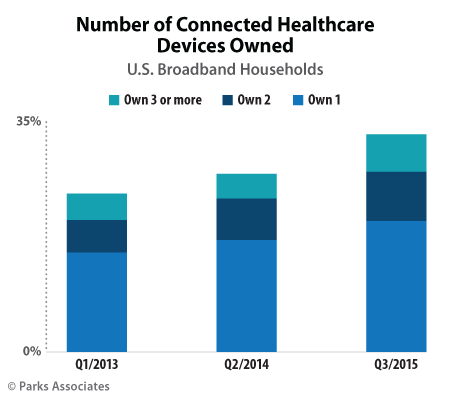How Cloud Connectivity Impacts Healthcare: Managing Chronic Diseases
Healthcare reforms in the U.S. and in other global markets are incentivizing care providers to take deeper interest in how their patients manage their health on a day-to-day basis. Connected health devices and apps, built on cloud-based platforms, give consumers and their care providers the insight they need to manage health conditions in a proactive, ongoing way. This is particularly important for those with chronic diseases, which account for the vast majority of healthcare expenditures.
Parks Associates research shows that about a third of U.S. broadband households own at least one connected health device, but less than half of current caregivers with smartphones use an app to help with their caregiving tasks. Technology-supported care holds the promise of keeping elderly patients of those with chronic diseases in their homes while enhancing their life comfort via intelligent preventive and alert systems.

The push for providing remote health services through cloud-based services is a large opportunity for smart home players. The connected health market represents many use cases that cross over to the smart home industry. Consumers spend less than 1% of their time interacting with the healthcare system (i.e., hospitals, clinics, doctors and health coaches). Home, on the other hand, is where consumers spend the most time with their family, and care for themselves and for others. They also make everyday decisions about food, drink, exercise, and sleep that impact their health and well-being. A smart home, can be a healthier home. Yet, while the home care market is a logical extension to the “smartness” of a connected home platform, it introduces a bevy of unique challenges and demands, such as high standards for reliability, data privacy, and security.
Cloud-based platforms are also advancing the use and functionality of Electronic Health Records (EHRs) and Electronic Medical Records (EMRs). Cloud-based EHR and EMR systems have the potential to solve the interoperability problem between different EHR systems, which is a continuous challenge for the industry. Not only do cloud software systems tend to work better with other cloud software, they are also more scalable than their server-based counterparts.
Some of the leading cloud platform players for the healthcare industry include: American Well, Independa, Intel-GE Care Innovations, Validic, and Welltok. Cloud platforms offer device makers and companies the opportunity to greatly expand the value of a product or service and cloud based platforms will continue as a growing technology solution for the digital health industry.
For more information on how cloud connectivity is changing the face of healthcare as well as other areas within the Internet of Things, see my industry report Cloud Platforms for the Internet of Things.
This article originally appeared on SMAHome.
Further Reading:
- Connected Health Device Adoption on the Rise in U.S.
- Only 4% of patients with three or more chronic conditions have a care coordinator
- Smart Home API Strategies: Open vs. Closed Systems
Next: How Revolutionary is Project Alloy: Intel’s New VR Tech?
Previous: Cloud-based Connectivity and Connected Cars
Comments
-
Be the first to leave a comment.
Post a Comment
Have a comment? Login or create an account to start a discussion.


